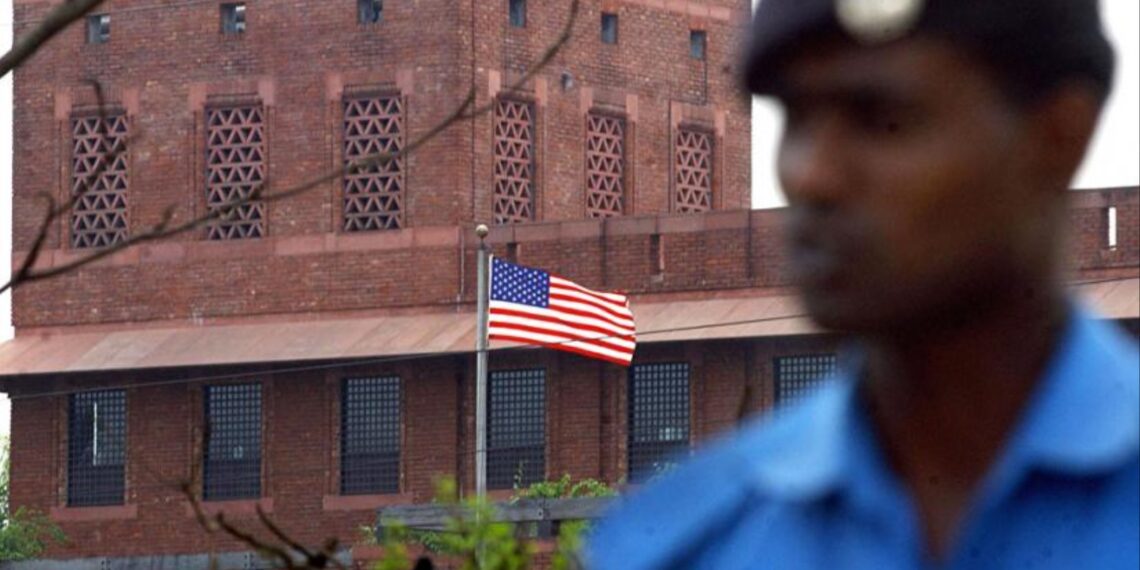India pulled out all stops and deployed an array of diplomatic resources to convince the US administration, especially the State Department, to not only go slow on imposing punitive measures against the Sheikh Hasina regime in Bangladesh but also come up with a watered down statement following the January 7 rigged elections that saw the Awami League return to power for a fourth consecutive time.
Meanwhile, after staying away from a Bangladesh Election Commission briefing two days before the January 7 election, American Ambassador in Dhaka, Peter D Haas, attended a briefing by Bangladesh Foreign Secretary Masud Bin Momen this evening.
A host of other foreign diplomats also attended Momen’s briefing.
At least three sources the Northeast News spoke with said that an important reason that led the US to reconsider immediately using “strong tools” or actively employing punitive measures against the Awami League regime was India’s successful leveraging of its own key position with the Department of Defence (DoD).
This, according to the sources, left a yawning gap between the State Department and the DoD’s objectives in relation to Bangladesh and India.
ALSO READ US and UK say Bangladesh elections ‘not free or fair’ and were marred by violence
Key international actors familiar with South Block’s unstinted support for Sheikh Hasina said a strong section within the American establishment was not willing to “alienate” New Delhi despite the existence of other thorny issues in Indian and US bilateral relations.
The DoD sought to build on the gains made during the November 10 2+2 India-US Ministerial Summit in New Delhi and did not want to jeopardise the growing defence ties with its “strategic partner” in South Asia.
This was at variance with the State Department’s consistently strong position against the New Delhi-backed Sheikh Hasina regime which was found to have committed gross human rights and labour rights violations, besides adopting repressive measures against the political opposition and shrinking the democratic sphere.
A key variable in the Bangladesh case was India which backed the Sheikh Hasina regime “to the hilt” and would not budge from its position on continuing to support a government irrespective of how unpopular it had become among Bangladeshis.
“The split between the State Department and DoD, centred around Bangladesh and India, was always very real,” one South Asia analyst said on conditions of anonymity.
ALSO READ MEA sources admit US envoy to Bangladesh Haas met senior officials in Delhi
Agreeing that the January 9 US statement was “weak”, a former State Department official and a keen Bangladesh observer said, “while statements alone aren’t going to do anything, somewhere along the line the US lost the plot or gave up or lost interest”.
An important contributing factor in “losing the plot” on Bangladesh is the White House’s preoccupation with the conflict in Gaza and the Israeli military offensive as also the approaching elections at home and “domestic concerns such as immigration”, the former State Department official said, adding that “so it may just be that there is not enough bandwidth to deal with Bangladesh”.
The sources said that for the past two months or so highly-placed Indian-origin White House and State Department officials besides some in the US Congress played a decisive role in convincing key policy makers to leave the Sheikh Hasina regime undisturbed as her continuation was vital to India’s regional and internal security interests.
It is now clear, the sources said, that the US will not exercise the option of a regime change in Dhaka – an active objective till at least November 15 – and will be content with continuing with its September 22, 2023 visa-related restrictions on some Bangladeshi individuals, including political leaders, bureaucrats and law enforcement officials.
They added that the US will likely limit its punitive measures, including economic sanctions.















